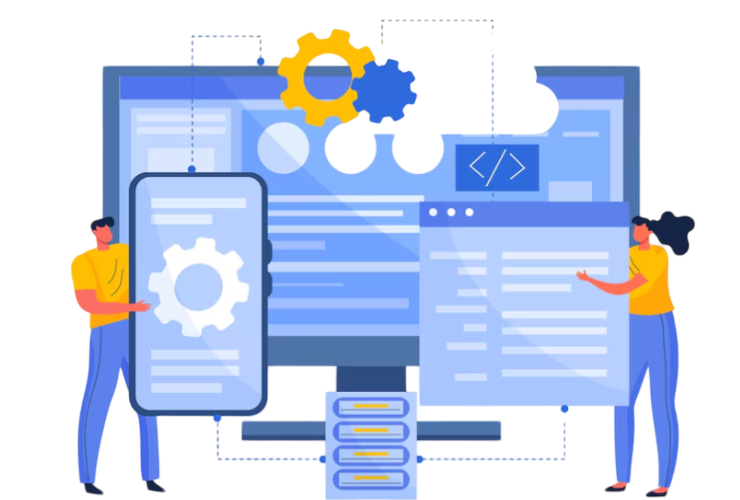What is a Custom Web Application?
A Custom Web Application is essentially an application that operates within any web browser. When deciding which browser to use for web apps, comparing options like Brave vs. Firefox is essential for ensuring compatibility, features, and a smooth user experience. Unlike desktop apps, there’s no need to download—users can access the application by simply logging into the website.
However, not every business will find a standard Custom Web Application suitable for their needs. In these cases, a custom web app is the ideal solution. Built on the same concept, a custom web app is tailored to your specific business processes, offering a versatile and user-friendly experience with the flexibility to grow alongside your business operations.
So, is a custom web application what your business needs? Let’s explore how it can drive your success to the next level.
Why Custom Web Apps Are the Superior Choice: Data-Backed Insights
Booming Market for Custom Web Apps: According to Statista, custom web app revenue is set to grow by 5.01% annually from 2024 to 2029, reaching a remarkable $898.90 billion by 2029.
Cost-Saving Benefits: Custom web apps can significantly cut operating costs, with G2 reporting reductions of up to 47% for many businesses.
Rising Demand for Developers: The Bureau of Labor Statistics (BLS) forecasts a 25% annual increase in the number of software developers from 2022 to 2032.
Developer Shortage: There’s a high demand for custom web developers, with 78% of positions remaining unfilled for extended periods.
An engaging online presence is crucial for businesses to reach a broad audience and showcase their offerings. Custom Web Applications are key to this, combining the seamless experience of native apps with the convenience of browser access across any device, and providing tailored solutions for your customers’ needs.
Having seen the compelling data on custom web apps, let’s dive into how desktop, mobile, and web applications differ.
Desktop, Mobile, or Web: Which App is Right for You?
Understanding the differences between desktop, mobile, and web apps is essential for businesses and users, as each type offers distinct benefits and limitations. Here’s a quick overview:
Desktop Apps: Installed directly on a computer, these apps offer high performance and deeper system integration. They often provide a richer experience but require more development time and resources.
Mobile Apps: Designed for smartphones and tablets, mobile apps deliver a smooth, touch-friendly experience. They can leverage device-specific features like the camera and GPS and are available for download from app stores.
Web Apps: Accessible through browsers on any device, web apps offer flexibility and ease of use across different platforms. However, they may not match the performance or feature access of native desktop or mobile apps.
By understanding the unique strengths of each platform, businesses can select the best approach to meet their goals and user needs.
Next, let’s dive into the specific advantages of custom web apps.
Benefits of Custom Web App Development for Your Business
1. Customized to Your Needs
A custom web app provides a solution tailored just for your business. By collaborating closely with developers, you gain complete control over every step— from planning and setting goals to implementation and ongoing maintenance.
If you’re struggling to find a ready-made solution that fits your needs perfectly, a custom web app could be the answer. It’s designed specifically to address your unique challenges and can be customized to match your exact requirements.
With features tailored to your needs, the app will be intuitive and user-friendly. This ensures your team can use it effectively and make the most of its capabilities for your business.
2. Huge Savings
While developing a custom web app often involves a higher initial cost compared to off-the-shelf solutions, it can lead to significant savings in the long run.
Though the upfront investment might be more substantial, a custom web app is designed to meet your specific needs without the cost of unnecessary features. Plus, you won’t face recurring licensing fees or usage charges.
Owning your custom app outright means you avoid ongoing expenses. Additionally, outsourcing the development to a software company can further reduce costs by minimizing the need for in-house infrastructure and equipment.
3. Customized Brand Design
A visually appealing web app is crucial for making a strong impression. With a custom design, you can ensure that your app perfectly reflects your brand identity.
Users are naturally attracted to engaging and attractive designs that capture their interest and encourage them to explore further. Custom web apps offer unlimited design flexibility, allowing you to create a unique and tailored look that stands out. Unlike off-the-shelf solutions with limited customization, a custom web app lets you fully align the design with your brand and create a memorable user experience.
4. Scalability and Flexibility
Custom web apps are both scalable and adaptable, making them a great choice for growing businesses. As your business expands, a custom web app can handle increased traffic and integrate new features without needing expensive upgrades.
These apps are designed to grow with your needs, offering flexibility to adjust to changing demands. This adaptability is why many businesses prefer custom solutions over off-the-shelf options. Custom web apps can be easily modified, which is especially valuable in fast-paced industries like e-commerce or entertainment.
5. Enhanced efficiency
Custom web apps are designed to boost your workflow efficiency, allowing you to get more done in less time and with greater accuracy.
Tailored to fit your business’s specific needs, a custom web app addresses your unique requirements and helps you streamline routine tasks. By automating repetitive processes, it saves you significant time and boosts productivity.
With everything centralized in one place, managing your information becomes easier, and you can further enhance efficiency by automating routine tasks.
6. Scaled Competitiveness
Competing with industry giants can be tough for small businesses, especially when using off-the-shelf solutions that blend in with the competition. Custom web apps offer a way to stand out and gain a strategic edge.
With a custom app, you get a unique solution tailored specifically to your needs. This helps you distinguish your business from others, making it easier for potential customers to notice and choose you.
Moreover, a custom web app lets you shape the software to fit your vision and goals, rather than forcing your ideas into a pre-made framework. This flexibility ensures that your app supports your business objectives and gives you a competitive advantage.
7. Minimized Custom Pain Points
Ready-made solutions often come with limited customization options, leading to the need for multiple tweaks and sometimes leaving certain features unchangeable. Plus, each change can add up in costs.
On the other hand, a custom web app is built to fit your exact needs from the start. You have full control over every detail, from design to functionality. With custom web app development, you can create a solution that perfectly aligns with your requirements, with no limits on how you want it to work.
8. 24/7 Access
This is especially great for businesses that work remotely.
Whether your team is working from home or the office, a custom web app ensures that data is always available. You don’t have to worry about access issues; your data is accessible anytime, anywhere.
Additionally, web apps offer easy access based on user permissions. All you need is an internet connection. Unlike other solutions, web apps can be accessed through almost any browser and device, providing unmatched flexibility.
9. Safety and Security
Security is a top priority in custom web app development and needs careful attention from developers. When done right, robust security measures can protect your data from potential threats.
Recent statistics show that India has seen a significant number of ransomware attacks, affecting over two-thirds of organizations in recent years.
Custom web apps provide the advantage of cloud-based data retrieval. With just a device, internet connection, and login credentials, you can access your data easily. This is often more cost-effective and less time-consuming than reinstalling or redeveloping a commercial app on a new device.
Commercial apps often come with minimal security and known vulnerabilities that hackers can exploit. In contrast, custom-coded apps are generally more secure and harder to breach, making them a tougher target for hackers.
10. Integration
Custom web apps seamlessly fit into your business’s workflow, offering significant integration benefits. One of the major advantages is the smooth connection with your databases.
With a custom web app, front-end and back-end processes synchronize effortlessly. This means that any information entered on the website automatically updates in the database. Plus, custom web apps can easily integrate with other tools you already use, boosting overall efficiency and streamlining your operations.
11. Zero Dependencies of Developers
Choosing off-the-shelf software means relying on the provider for pricing, terms, and updates. If you need additional features later, it can be both time-consuming and costly to adapt.
Custom apps, on the other hand, offer greater flexibility. You can adjust and expand them as your business grows. Although there are maintenance costs, the long-term advantages and scalability of custom solutions often make the initial investment worthwhile.













 Database Development
Database Development












































